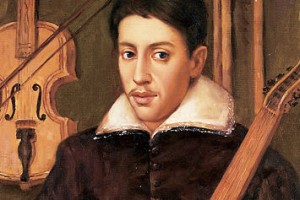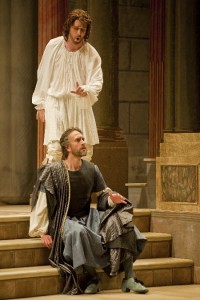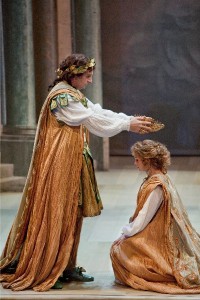Opera Review: ‘L’Incoronazione di Poppea’
By Caldwell Titcomb

Claudio Monteverdi
If you know a bit about opera, you will have heard of Verdi – but perhaps not of Monteverdi. Claudio Monteverdi (1567-1643) was the first major composer in the history of opera, and the biennial Boston Early Music Festival (BEMF) is presenting his last opera, “L’Incoronazione di Poppea” (“The Coronation of Poppaea”) as the central event in its many offerings from June 6 to 14.
Monteverdi’s first work for the stage was “Orfeo” (1607), followed by “Arianna” (1608). The Festival’s big 300-page yearbook contains a Historical Timeline, which states that “Arianna” is lost. But there does survive Arianna’s famous lament (‘Lasciate mi morire’ [‘Let me die’]), which was the most admired piece of music in its time and one of the finest compositions of the entire 17th century.
It is true that nearly a dozen subsequent Monteverdi works for the stage are lost. But at the end of his life he wrote two operas that we fortunately have: “Il Ritorno d’Ulisse in Patria” (1640) and “Poppea” (1642), both of which had their Venice premieres in the first public opera house (opened 1637).
“Poppea” poses quite a few problems. The two sources for the music come after the composer’s death – Naples in 1651 and Venice in 1656. There are some discrepancies between them, though the figured bass, which indicates the harmony, is generally reliable. No specific instrumentation is indicated, so the musical co-directors – Paul O’Dette and Stephen Stubbs – had to decide who plays what. Their admirable solution was to have a chamber orchestra of two harpsichords (a standard practice in early opera), five bowed string instruments, Baroque harp, and two chitarroni (long-necked bass lutes, played by O’Dette and Stubbs). A few chunks of music plus the concluding duet (“Pur ti miro”) come from the hands of younger composers – probably Francesco Sacrati (1605-50) and/or Benedetto Ferrari (ca. 1603-81).
The libretto, much of it in rhyme, was written by Giovanni Francesco Busenello (1598-1659), based on the “Annales” of the ancient Roman historian Tacitus, treated with some freedom. The libretto survives in six manuscripts, one of which was only recently discovered.

Mercurio (Jesse Blumberg) listens to Seneca (Christian Immler) warble.
The cast includes a number of deities: Fortune, Virtue, Cupid, Mercury, and Pallas Athena. But the emphasis is on actual historical personages. The Emperor Nero’s ambassador Otho returns from a business trip to find the notoriously unsavory emperor having an affair with Otho’s wife Poppea. There are warnings, intrigues, eavesdroppings, and conspiracy to murder, with plenty of lying and false confession, in which Nero’s empress Octavia is heavily involved. Nero hopes to ditch Octavia and marry Poppea. Only the old philosopher Seneca (baritone Christian Immler) voices disapproval, and for his trouble is ordered to commit suicide, which he stoically does. Cupid intervenes to halt the attempted murder of Poppea – a true instance of deus ex machina. Nero sends his wife and Otho into exile, and crowns Poppea as his empress, to general celebration. With poor Seneca dead, lust and malevolence triumph.
Aside from the concluding ensemble and a few duets, the opera is mainly a series of vocal solos. Although only one number is labeled “aria,” there are some pieces that could be termed arietta or arioso. But most of the three hours of music is accompanied recitative, which is surely difficult to memorize, though these singers manage the challenge admirably. What is particularly impressive is the vocalists’ ability to alter their expression to suit the quickly shifting demands of the libretto.
Tenor Marcus Ullman portrays Nero, who repeatedly anticipates Richard Nixon’s claim, “When the President does it, that means that it is not illegal.” On learning of Seneca’s death, he and his pal Lucan (tenor Russ Hauck) indulge in a wonderful coloratura duet. Mezzo-soprano Stephanie Houtzeel is Octavia, who plots the death of her rival; she has two supreme monologues: “Despised queen” in Act 1, and her farewell to Rome in Act 3. Soprano Gillian Keith is Nero’s lover Poppea, who participates in a few lovely duets. Her buxom nurse Arnalta is played by mezzo-soprano Laura Pudwell, who injects some humor into the role while craving a higher level in society. Baritone Holger Falk is fine as the cuckolded Otho, who is amorously pursued by soprano Amanda Forsythe as Drusilla. The male god Cupid is sung by soprano Nell Snaidas (as would often have happened in Monteverdi’s day).

Nero (Marcus Ullmann) crowns Poppea (Gillian Keith).
For this production Gilbert Blin is both stage director and set designer; in 2008 he was named the BEMF’s Stage Director in Residence. He has moved the performers around convincingly for the most part. In the yearbook he has written a lengthy essay about the history of stage design from the time of Vitruvius in the first century BCE up to Giovanni Burnacini (ca. 1610-55), who did the orginal sets for “Poppea.”
For this “Poppea” Blin has designed a symmetrical set with lots of Corinthian columns on the sides. A central passageway suggests an outdoor street. Half way along a curtain is occasionally lowered to suggest indoor scenes. There are three wide steps downstage, culminating at left and right in a pair of plinths, on which from time to time the divinities stand statuesquely. The scene in Seneca’s garden poses no special problem. But the one awkward scene is that in which Poppea stretches out on the barren street, when she is supposed to be surrounded by greenery and sings about “clos[ing] my eyes in the lap of repose, here in the garden.”
Anna Watkins has designed colorful costumes for everyone except the five deities, who are all clothed in pure white. Lenore Doxsee has designed the lighting. And Ellen Hargis is responsible for the English translation printed in the yearbook and projected as supertitles above the proscenium.
Normally the BEMF elects to stage a work that it has not mounted before. This time, “Poppea” is making a second appearance, having been put on at the first Festival in 1981. Surely an opera as important as this warrants local exposure at least once a generation.
This production continues through June 14 at the Calderwood Pavilion in the Boston Center for the Arts, 527 Tremont Street. It then proceeds to the Berkshires for three performances (June 19-21) at the Mahaiwe Performing Arts Center, 14 Castle Street, Great Barrington.

[…] Opera Review: 'L'Incoronazione di Poppea' : The Arts Fuse Blog […]